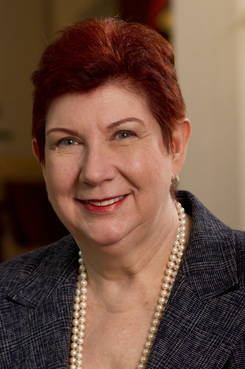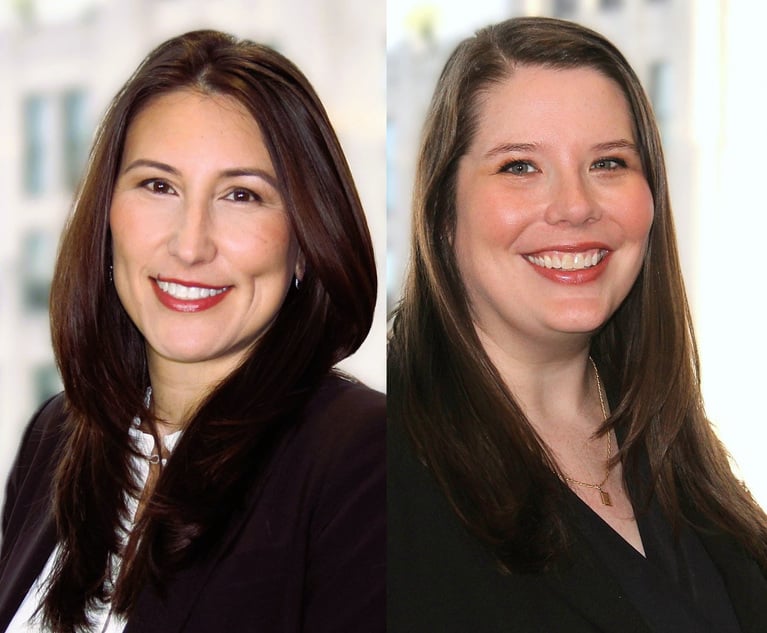Lawyers Like Learning; Good Mentors Like Teaching
Young attorneys in his practice area must understand the client base. ... Some people mistakenly think that bringing in business is a matter of knowing how to work a room, but clients aren't looking for a charming personality.
October 12, 2018 at 10:06 AM
4 minute read
 Robin Hensley, Raising the Bar
Robin Hensley, Raising the BarOne of the first rules of practice development, says J. Scot Kirkpatrick, is “you have to bring the younger people along.”
Kirkpatrick, a shareholder at Chamberlain Hrdlicka, has led the trust and estates group in the firm's Atlanta office since 1989. “An essential part of growing a practice is mentoring,” Kirkpatrick says he has learned over the years.
The transformation from eager young lawyer to a steady, mature person who is making a solid contribution to the practice will go much faster if senior lawyers get involved, Kirkpatrick says. Chamberlain has a well-thought-out formal program for mentoring, including accountability metrics, but Kirkpatrick says it's the informal daily interaction between senior and junior lawyers and a commitment to teaching and learning that make the difference.
Having mentored dozens of young lawyers over the years, he shared these guidelines for mentoring success.
Don't expect overnight results.
Kirkpatrick says new lawyers can take five years to really “get their feet wet,” and he expects them to study hard and ask questions. In return, Kirkpatrick puts in the time to tutor the new lawyers in the finer aspects of tax, partnerships, trusts and state corporate codes.
Just as important, he says young attorneys in his practice area must understand the client base—in his case, mostly closely held business owners. Kirkpatrick says some people mistakenly think that bringing in business is a matter of knowing how to work a room, but clients aren't looking for a charming personality. “Clients want someone who understands their needs and can apply the law to solve their problems. I'm a natural introvert and don't light up any rooms, but put me in front of 50 CPAs, and I will make connections because I am passionate about what I do.”
Business development training starts early.
Kirkpatrick's formula for business development is simple: “First, you need to know something— be the expert, as your expertise is what you are selling. Second, you have to become known as that expert so that people will pick up the phone and call you.”
Kirkpatrick is a firm believer in having young lawyers tag along when he visits clients, as well as the CPAs and financial advisers who are a source of referrals. This is mainly an exercise in “watch and listen,” and it is enormously helpful in learning how to talk to clients. “My partner, Tom Jones, says legal marketing boils down to convincing a potential client who has a problem that you are the one who can solve it for them,” says Kirkpatrick. Client meetings are where those skills are learned.
He also brings associates along when he presents at conferences, including the firm's signature Tax Forums. “They learn that, if you're going to stand up in a room of 100 people and teach them, you better know your material inside and out.”
Law still is an apprenticeship system.
It is important to remember that the law remains an apprenticeship system, Kirkpatrick says. “People who go to law school usually like to learn. I think it's important for all of us—senior lawyers and younger lawyers—to embrace this culture of learning.”
Kirkpatrick concedes that it sometimes is difficult to find the extra time for mentoring, whether it is editing an associate's writing or taking a few minutes to answer an impromptu question. But he likes to remind himself that it's in his best interest. “I tell my folks, the real value of having associates is that one day they will grow up and be your partner. They will be able to do the work and share the load. It's up to us to help them get there for their own benefit and the firm's.”
Robin Hensley's column is based on her work as president of Raising the Bar and coaching lawyers in business development for more than 25 years. She is the author of “Raising the Bar: Legendary Rainmakers Share Their Business Development Secrets.”
This content has been archived. It is available through our partners, LexisNexis® and Bloomberg Law.
To view this content, please continue to their sites.
Not a Lexis Subscriber?
Subscribe Now
Not a Bloomberg Law Subscriber?
Subscribe Now
NOT FOR REPRINT
© 2025 ALM Global, LLC, All Rights Reserved. Request academic re-use from www.copyright.com. All other uses, submit a request to [email protected]. For more information visit Asset & Logo Licensing.
You Might Like
View All

CFPB Proposes Rule to Regulate Data Brokers Selling Sensitive Information
5 minute read
Trending Stories
- 1Trade Wars: Five Tips for Legal Teams to Manage Tariffs and Trade in Trump II
- 2Balancing Attorney-Client Privilege With a Lawyer’s Right to Defend Against Allegations of Wrongdoing
- 3Public Interest Calendar of Events
- 4Sharpening Residential Insurance Fraud Defense Strategies: Insights for Insurers to Mitigate Risk in 2025
- 5Reversal of Fortune: Restoring Owners’ Equity Under New Jersey’s Tax Sale Law
Who Got The Work
J. Brugh Lower of Gibbons has entered an appearance for industrial equipment supplier Devco Corporation in a pending trademark infringement lawsuit. The suit, accusing the defendant of selling knock-off Graco products, was filed Dec. 18 in New Jersey District Court by Rivkin Radler on behalf of Graco Inc. and Graco Minnesota. The case, assigned to U.S. District Judge Zahid N. Quraishi, is 3:24-cv-11294, Graco Inc. et al v. Devco Corporation.
Who Got The Work
Rebecca Maller-Stein and Kent A. Yalowitz of Arnold & Porter Kaye Scholer have entered their appearances for Hanaco Venture Capital and its executives, Lior Prosor and David Frankel, in a pending securities lawsuit. The action, filed on Dec. 24 in New York Southern District Court by Zell, Aron & Co. on behalf of Goldeneye Advisors, accuses the defendants of negligently and fraudulently managing the plaintiff's $1 million investment. The case, assigned to U.S. District Judge Vernon S. Broderick, is 1:24-cv-09918, Goldeneye Advisors, LLC v. Hanaco Venture Capital, Ltd. et al.
Who Got The Work
Attorneys from A&O Shearman has stepped in as defense counsel for Toronto-Dominion Bank and other defendants in a pending securities class action. The suit, filed Dec. 11 in New York Southern District Court by Bleichmar Fonti & Auld, accuses the defendants of concealing the bank's 'pervasive' deficiencies in regards to its compliance with the Bank Secrecy Act and the quality of its anti-money laundering controls. The case, assigned to U.S. District Judge Arun Subramanian, is 1:24-cv-09445, Gonzalez v. The Toronto-Dominion Bank et al.
Who Got The Work
Crown Castle International, a Pennsylvania company providing shared communications infrastructure, has turned to Luke D. Wolf of Gordon Rees Scully Mansukhani to fend off a pending breach-of-contract lawsuit. The court action, filed Nov. 25 in Michigan Eastern District Court by Hooper Hathaway PC on behalf of The Town Residences LLC, accuses Crown Castle of failing to transfer approximately $30,000 in utility payments from T-Mobile in breach of a roof-top lease and assignment agreement. The case, assigned to U.S. District Judge Susan K. Declercq, is 2:24-cv-13131, The Town Residences LLC v. T-Mobile US, Inc. et al.
Who Got The Work
Wilfred P. Coronato and Daniel M. Schwartz of McCarter & English have stepped in as defense counsel to Electrolux Home Products Inc. in a pending product liability lawsuit. The court action, filed Nov. 26 in New York Eastern District Court by Poulos Lopiccolo PC and Nagel Rice LLP on behalf of David Stern, alleges that the defendant's refrigerators’ drawers and shelving repeatedly break and fall apart within months after purchase. The case, assigned to U.S. District Judge Joan M. Azrack, is 2:24-cv-08204, Stern v. Electrolux Home Products, Inc.
Featured Firms
Law Offices of Gary Martin Hays & Associates, P.C.
(470) 294-1674
Law Offices of Mark E. Salomone
(857) 444-6468
Smith & Hassler
(713) 739-1250







